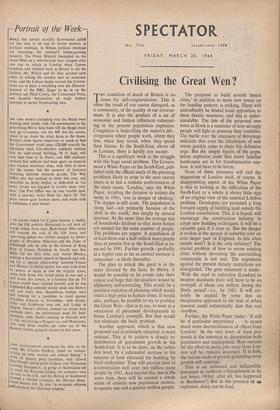Civilising the Great Wen ?
MHE condition of much of Britain is no 1 cause for self-congratulation. This is often the result of our coarse disregard, as a community, of the quality of our environ- ment. It is also the product of a set of economic and human influences culminat- ing in the present population explosion. Congestion is bedevilling the nation's life congestion where people work, where they live, when they travel, when they spend their leisure. In the South-East, above all in London, there is hardly any escape.
This is a significant week in the struggle with this huge social problem. The Govern- ment's White Paper on the South-East, pub- lished with the official study of the planning problems likely to arise in the next twenty years, is at last a realistic confrontation of the main issues. 'London,' says the White Paper, recalling the decision to initiate the study in 1961, 'was in danger of choking.' The danger is still acute. The population is rising fast—not primarily because of the `drift to the south,' but simply by natural increase. At the same time the average size of households declines so that more homes are needed for the same number of people. The problems are urgent. A population of at least three and a half million more people than at present live in the South-East is ex- pected by 1981. Further growth—probably at a higher rate so far as natural increase is concerned—is likely thereafter.
The plan to attack this giant is in the main dictated by the facts. In theory, it would be possible to let events take their course and hope that the situation would be ultimately self-correcting. This would be a senseless rejection of planning which would exact a high price in human terms. It would also, perhaps, be possible to try to poultice the Great Wen—that is to say, to trust to a succession of piecemeal developments to house London's overspill. But that would not eliminate the basic problem.
Another approach, which is that now proposed and in principle accepted, is more rational. This is to achieve a drastic re- distribution of population growth in the South-East. It is to be done, on the ortho- dox level, by a substantial increase in the amount of land allocated for building by local authorities. They will provide land to accommodate well over two million more people by 1981. And beyond this, but at the same time, there will be created a whole series of entirely new population centres, to receive one and a quarter million people. The proposal to build several 'major cities,' in addition to more new towns on the familiar pattern, is striking. There will undoubtedly be heated local opposition to these drastic measures, and this is under- standable. The fate of the proposed new town at Hook is a reminder of how strongly people will fight to preserve their localities. The battle over the extension of Stevenage indicates that even the inhabitants of new towns quickly come to share this defensive urge. But the simple figures of the popu- lation explosion insist that many familiar landscapes are in for transformation any- how. It will have to be borne.
None of these measures will end the magnetism of London itself, of course. A disappointing aspect of the White Paper is that in looking at the difficulties of the South-East as a whole it shows little sign of an original view of the essential London problem. Developers are promised a. long forward supply of building land outside the London conurbation. This, it is hoped, will encourage the construction' industry to adopt new building techniques. It will be a. valuable gain if it does so. But the danger it evokes is the spread of suburbia over an ever larger part of England. Is this what people want? Is it the only solution? The crucial problem of how to renew existing cities without devouring the surrounding countryside is not met. The arguments against the present density restrictions are disregarded. The grim statement is made : `With the need to redevelop [London] to modern standards there will have to be an overspill of about one million during the Study period'—i.e., by 1981. It will cer- tainly be argued by some that an imaginative approach to the task of urban renewal could substantially dam this vast overflow.
Further, the White Paper states : 'It will be of particular importance . . . to secure much more decentralisation of offices' from London.' At the very heart of these pro- posals is the intention to decentralise both population and employment. How success- ful the effort to move jobs away from Lon- don will be, remains uncertain. If it fails, the vicious circle of growth generating more growth will continue. This is an awkward and indigestible document to confront a Government in its last hours. (What, after all, has happened to Buchanan?) But in the presence 'of aa explosion, delay can be fatal.








































 Previous page
Previous page